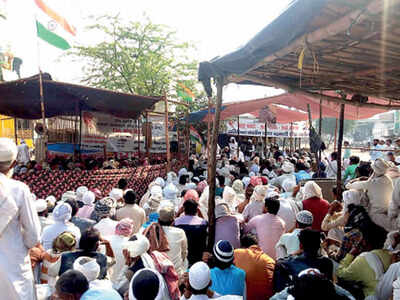
GURUGRAM: About 100 km from the seat of the Delhi riots, Mewat's 'Shaheen Bagh' is feeling the heat.
"Things have changed since Delhi was allowed to burn," said Salamuddin, a lawyer and president of the Mewat Vikas Sabha.
The peaceful protest at Badkali Chowk against CAA, NRC and NPR began exactly a month ago, on the death anniversary of Gandhi. All of Mewat has been under Section 144 for about two months now, but the protest continues. The makeshift tent has been put together by locals just a little ahead of Badkali Chowk, sectioned into halves for women and men. It started with a handful of people holding readings of the Constitution, poetry and ghazals. By now, about 1,500 attend the protest every day.
While the stir expanded by the day, police had not tried to clear the protest site - some cops said everything had been peaceful and they saw no reason to take action - until now. "As pressure builds up elsewhere, the administration here has also been growing apprehensive. They have been asking us to end the protest. But we are determined to press on," Salamuddin said.
The middle ground they have reached is this - no speaker from outside will be invited for a week or so, and all speeches will be screened. "No matter what happens in Delhi, we will not allow that to spill over here. There is no space for hatred," said Mohammed Sabir Qasmi, president of Jamiat Ulama e Hind's Gurugram unit.
Atif, a young protester, said many in his family live in areas that were torched during the riots in north-east Delhi. "Some of them fled from Hauz Rani and Shiv Vihar. They have been forced to abandon everything they have known, their houses and mosques razed to the ground - but they don't blame anyone. They have been asking us not to fall for hate speech," he added.
Closer home, a fringe outfit, Hindu Sena, has unleashed an inflammatory campaign in Gurugram. But protesters are determined to keep that rhetoric out of the demonstration space here. "We want action against politicians who incite violence and force minorities to flee their homes. But we don't want our people here to get instigated. We will go by what Gandhi and Ambedkar said and keep peace. We read their works here every day," said Atif.
Every day, around 10am, the spot comes alive with the national anthem played on speakers. By noon, people from areas nearby flock to the protest, national flags and posters of Gandhi and Ambedkar in hand. They read the paper, perform skits and debate the political nuances of the law they are opposing. The day ends, again, with the national anthem. "We want harmony. The point of our protest is to preserve that. We are not against anyone, nor is anyone against us," said Qasmi.
In keeping with the spirit of the protests that inspired them, it's women at the forefront of the Badkali Chowk protest too. "Women have been leading our protest. Some who never spoke a word in the presence of men are addressing large gatherings. Young girls recite nazms, relate their experiences and give speeches," said Salamuddin.
And what do they speak of? "Our girls talk about the schools they never got, the safety they never had and the fears they always live with. They find it liberating," said a 65-year-old woman.
"Things have changed since Delhi was allowed to burn," said Salamuddin, a lawyer and president of the Mewat Vikas Sabha.
The peaceful protest at Badkali Chowk against CAA, NRC and NPR began exactly a month ago, on the death anniversary of Gandhi. All of Mewat has been under Section 144 for about two months now, but the protest continues. The makeshift tent has been put together by locals just a little ahead of Badkali Chowk, sectioned into halves for women and men. It started with a handful of people holding readings of the Constitution, poetry and ghazals. By now, about 1,500 attend the protest every day.
While the stir expanded by the day, police had not tried to clear the protest site - some cops said everything had been peaceful and they saw no reason to take action - until now. "As pressure builds up elsewhere, the administration here has also been growing apprehensive. They have been asking us to end the protest. But we are determined to press on," Salamuddin said.
The middle ground they have reached is this - no speaker from outside will be invited for a week or so, and all speeches will be screened. "No matter what happens in Delhi, we will not allow that to spill over here. There is no space for hatred," said Mohammed Sabir Qasmi, president of Jamiat Ulama e Hind's Gurugram unit.
Atif, a young protester, said many in his family live in areas that were torched during the riots in north-east Delhi. "Some of them fled from Hauz Rani and Shiv Vihar. They have been forced to abandon everything they have known, their houses and mosques razed to the ground - but they don't blame anyone. They have been asking us not to fall for hate speech," he added.
Closer home, a fringe outfit, Hindu Sena, has unleashed an inflammatory campaign in Gurugram. But protesters are determined to keep that rhetoric out of the demonstration space here. "We want action against politicians who incite violence and force minorities to flee their homes. But we don't want our people here to get instigated. We will go by what Gandhi and Ambedkar said and keep peace. We read their works here every day," said Atif.
Every day, around 10am, the spot comes alive with the national anthem played on speakers. By noon, people from areas nearby flock to the protest, national flags and posters of Gandhi and Ambedkar in hand. They read the paper, perform skits and debate the political nuances of the law they are opposing. The day ends, again, with the national anthem. "We want harmony. The point of our protest is to preserve that. We are not against anyone, nor is anyone against us," said Qasmi.
In keeping with the spirit of the protests that inspired them, it's women at the forefront of the Badkali Chowk protest too. "Women have been leading our protest. Some who never spoke a word in the presence of men are addressing large gatherings. Young girls recite nazms, relate their experiences and give speeches," said Salamuddin.
And what do they speak of? "Our girls talk about the schools they never got, the safety they never had and the fears they always live with. They find it liberating," said a 65-year-old woman.
Trending Topics
LATEST VIDEOS
City
 Watch: Artists perform at 4th Guwahati International Music Festival
Watch: Artists perform at 4th Guwahati International Music Festival  Days after Delhi riots, ‘shoot the traitors’ slogans raised at Rajiv Chowk metro station
Days after Delhi riots, ‘shoot the traitors’ slogans raised at Rajiv Chowk metro station  Gokulpuri ACP narrates horrific violent clashes in Northeast Delhi
Gokulpuri ACP narrates horrific violent clashes in Northeast Delhi  SP leader, bridegroom booked for celebratory firing during a wedding in Meerut, video goes viral
SP leader, bridegroom booked for celebratory firing during a wedding in Meerut, video goes viral
More from TOI
Navbharat Times
Featured Today in Travel
Get the app



